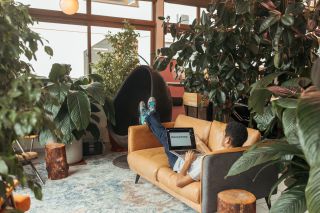Workplace Dynamics
Grow a (Green) Spine at Work
A little bit of nature could do a lot of good at the office.
Posted September 28, 2023 Reviewed by Gary Drevitch
Key points
- A recent study shows that workers respond positively to any type of nature in the office.
- Even artificial plants, or sounds of water, helped to boost mood and improve productivity.
- The less access workers had to natural light or plants, the more powerful the impact when it was introduced.

Many of us have been experimenting with new ways to work over the last few years. The widespread shutdowns during the pandemic made some people realize just how much they could do from home or another remote location.
And the huge interest in remote work (full or part-time) has remained. One study found that 98 percent of workers still want to work remotely, according to Forbes. But we’re still perfecting how to work well, whether that’s more efficiently, less stressed, or just better. However, we define that for ourselves.
And while a better productivity app or a standing desk are great technological tools, there’s a much older resource that we should all access more. Best of all, it’s inexpensive and available everywhere.
More nature—of any size or shape—could help with productivity and efficiency.
In Harvard Business Review, Anthony Klotz, Shawn McClean, and Pok Man Tang wrote about their study that led to an interesting discovery about the powerful effects of nature on how we work. Studying workplaces in the U.S., Canada, China, New Zealand, and Indonesia, the researchers assessed how much contact with nature workers had at the office. (They defined “contact with nature” pretty broadly: from working near plants to hearing the sound of running water.)
They found a high correlation between contact with nature and worker productivity and well-being. Then, they conducted an experiment: putting potted plants near some desks, and office supplies near others. The results were the same: Those who had even a plant near their desk reported increased creativity and better performance. In other words, even a little bit of nature had an impact.
Corporate green: The natural next step in reinventing the workplace.
Companies that want to offer more than just a few potted plants are finding ways to truly grow their connection to nature. Some companies are exercising a complete overhaul of their space: L.L. Bean spent over $110 million redesigning their Maine headquarters to address the fact that 90 percent of their employees didn’t have access to natural light (and this is a company that specializes in outdoor gear). The new space not only features windows around the entire perimeter but also includes a massive internal courtyard that brings the outdoors into the building center.
In London’s Canary Wharf business district, an architecture firm will transform the skyscraper and concrete-dominated space by introducing a “green spine.” They will be adding parks, gardens, and waterside access throughout and the wharf itself will offer opportunities for paddleboarding and kayaking.
Turn over a new leaf at home.
Even if your company doesn’t provide a waterfront view and park access, the study emphasized how little nature it takes to get a boost. Even artificial plants were reported to have an impact. And the more removed you are from nature (think: a job in a warehouse or manufacturing plant), the more a little bit of outdoors helps.
It seems that the less nature we have, the more we need it. The good news is that for those of us who work at home fully or part of the time, we can easily update our work environment in small ways that will still impact us. If you can position your workspace near natural light, that’s an easy and instant boost.
If that’s not realistic, a small plant can also be very helpful. And more subtle design elements that aren’t even living beings but just reminiscent of them help too. A study showed that the fractal patterns that are so common in nature (the infinite pattern of a pine cone or head of broccoli) can help reduce anxiety and promote concentration.
Even the smallest doses of nature boost our well-being, productivity, and mood.
The bottom line: Not all of us can take our laptops to the beach. Some of us don’t even work near a window with a view. But it turns out that we are so sensitive to the powerful effects of nature that the smallest connections can help our workday experience.
If we’re at home, small upgrades are easy and affordable. Even those of us who have returned to the office should become more aware of how our environment influences us. It turns out that the faux fern in the corner might be doing more good than you realized.




